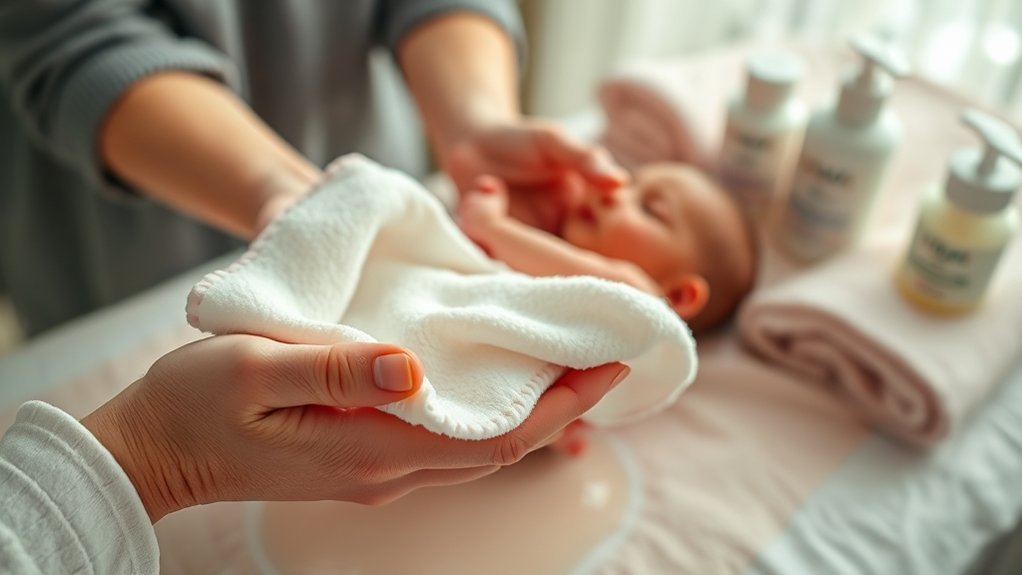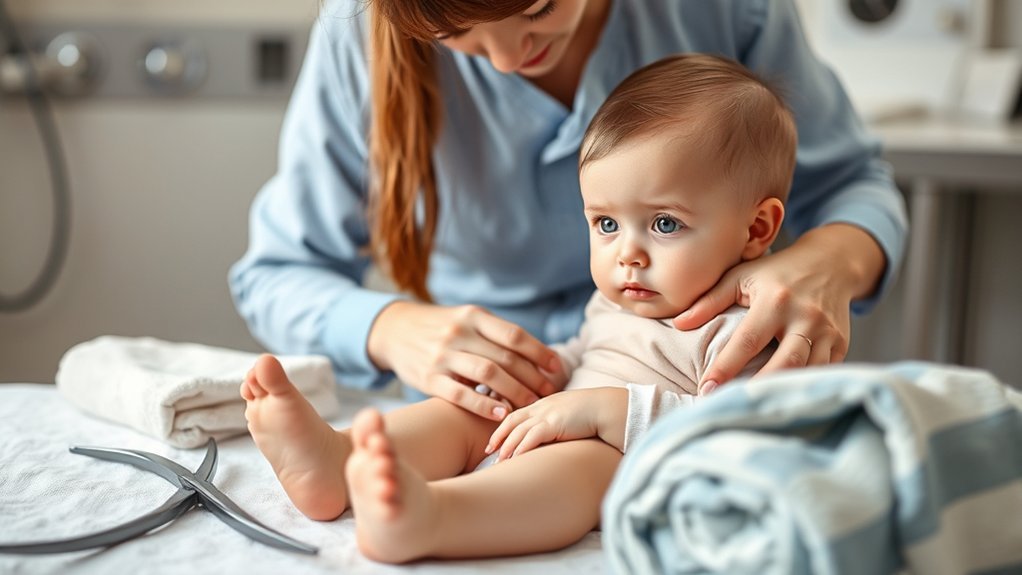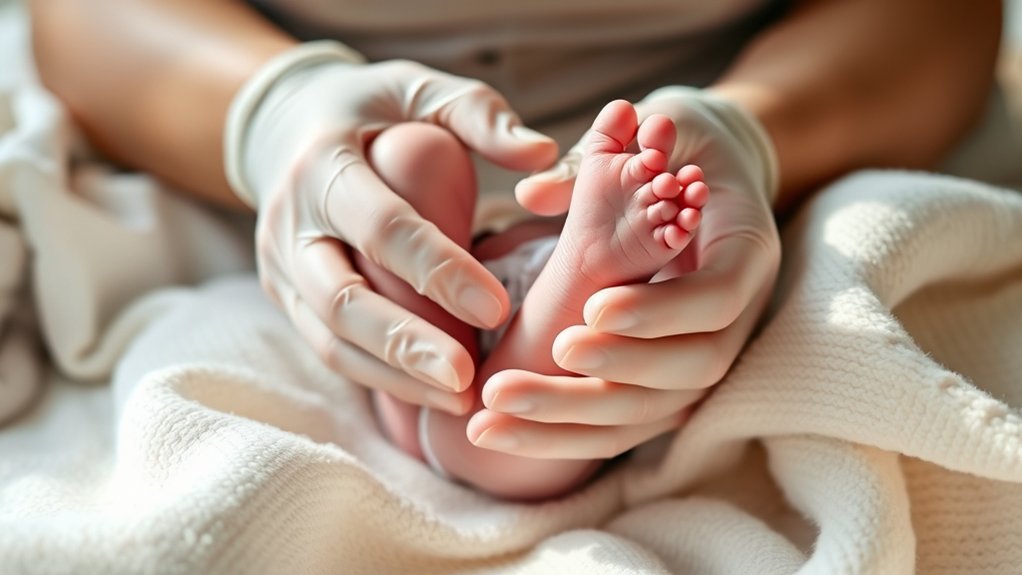Perineal care is like laying a strong foundation for your child’s health and hygiene. It’s not just about keeping them clean; it’s about ensuring their comfort and preventing potential issues. As a parent, you play a vital role in this delicate process. Understanding the right techniques and recognizing signs of discomfort can empower you both. What steps can you take to foster good habits and promote independence in your child’s care routine?
Understanding Perineal Care for Children
Understanding perineal care for children is essential, especially since maintaining hygiene in this sensitive area can prevent infections and discomfort.
Proper perineal care involves cleaning the genital area and anal regions, particularly during diaper changes for infants and toddlers. Always wipe from front to back to reduce the risk of urinary tract infections, which are more common in girls due to their shorter urethra.
For children with incontinence or those toilet training, more frequent personal hygiene routines are necessary to avoid skin irritation. Use gentle cleansers and warm water, steering clear of harsh soaps that can irritate delicate skin.
Keep an eye out for signs of irritation, rashes, or infections, and consult a healthcare provider if any concerns arise. It’s also important to incorporate regular check-ups to monitor your child’s overall health and hygiene needs.
Importance of Hygiene in Sensitive Areas
Maintaining hygiene in sensitive areas, like the perineum, is essential for preventing infections and ensuring skin integrity.
You want to promote comfort and dignity for yourself or your loved ones, especially when mobility is limited.
Infection Prevention Strategies
While caring for sensitive areas, it is crucial to prioritize hygiene to prevent infections that can lead to discomfort and complications. Proper perineal care will greatly reduce the risk of urinary tract infections (UTIs) and skin irritations.
| Strategy | Description | Benefit |
|---|---|---|
| Clean Regularly | Wash from front to back, especially for females. | Minimizes germ spread |
| Address Incontinence | Change soiled items promptly to reduce moisture. | Prevents bacterial growth |
| Monitor for Symptoms | Look for swelling or unusual discharge. | Guarantees prompt intervention |
Maintaining Skin Integrity
Your skin’s integrity in sensitive areas, like the perineum, is essential for overall health and comfort. Understanding the importance of perineal care is crucial, as this skin is thinner and more prone to skin breakdown.
Regular cleaning of the private area helps prevent infections, especially in individuals with limited mobility or incontinence. Maintaining cleanliness reduces the risk of bacterial and fungal growth, minimizing irritation and discomfort.
Daily hygiene practices can enhance not only physical well-being but also psychological comfort for both you and your loved one. Using gentle cleansers and barrier creams can protect sensitive skin from moisture-related issues, ensuring the skin remains healthy and intact.
Prioritize this care to foster a safer, more comfortable environment.
Promoting Comfort and Dignity
Ensuring proper hygiene in sensitive areas not only prevents infections but also plays an essential role in promoting comfort and dignity for children.
By maintaining cleanliness, you’re reducing the risk of urinary tract infections and skin irritations, which can lead to discomfort. Regular perineal care helps eliminate odors and moisture, enhancing your child’s overall well-being.
Respecting their privacy during these routines fosters a sense of dignity, allowing them to feel secure and valued. As children grow, involving them in their own hygiene practices teaches responsibility and emphasizes the importance of cleanliness.
Signs of Irritation and Discomfort
How can you tell if your child is experiencing discomfort in the perineal area? Look for signs of irritation like redness, swelling, or rashes, as these may need immediate attention to prevent further issues.
Discomfort can also show up as itching, burning sensations, or unusual odors, suggesting inadequate cleaning or a potential health concern. If your child frequently complains of pain during urination or bowel movements, it’s essential to assess the situation.
Skin breakdown or sores may appear from prolonged moisture exposure, indicating the need for more frequent cleaning and protective measures.
Additionally, changes in your child’s behavior, such as increased fussiness or reluctance to engage in activities, can signal discomfort that’s linked to perineal irritation. It’s also important to be aware of the potential impact of neonatal care on your child’s overall health and comfort.
Recommended Products for Perineal Care

When it comes to perineal care, choosing the right products can make a big difference in comfort and hygiene.
You’ll find that essential cleaning supplies, skin protection creams, and convenient disposable wipes play crucial roles in this process.
Let’s explore these recommendations to help you provide the best care for your loved one.
Essential Cleaning Supplies
Gathering the right cleaning supplies for perineal care can make a significant difference in the comfort and hygiene of both you and your child.
Start with clean washcloths and warm water, using a mild soap or skin cleanser that’s gentle and fragrance-free to avoid irritation in the private area. Disposable wipes can also be handy for quick cleanups.
Don’t forget gloves to maintain hygiene and prevent infections during the process. A waterproof bed pad is essential to protect the bed from moisture and keep the environment clean.
Finally, having paper towels for drying and clean towels for comfort will streamline the process, ensuring that you both feel secure and cared for during this intimate routine.
Skin Protection Creams
Choosing the right skin protection cream is essential to maintaining your child’s comfort and preventing irritation in the perineal area. These creams create a barrier on the skin, shielding it from moisture and irritants. Look for products containing zinc oxide, as they’re effective against diaper rash. Moisturizing creams with lanolin or dimethicone can also help keep the skin hydrated.
| Recommended Ingredients | Benefits |
|---|---|
| Zinc Oxide | Soothes and protects |
| Lanolin | Hydrates and reduces friction |
| Dimethicone | Creates a protective barrier |
Always opt for fragrance-free and hypoallergenic options to minimize the risk of irritation. Regular application after cleaning can greatly improve your child’s skin health and comfort.
Disposable Wipes Benefits
While you navigate the challenges of perineal care, disposable wipes can be a game-changer. These wipes offer a convenient and hygienic solution for cleaning, eliminating the need for water or extra products.
Many disposable wipes are crafted with skin-friendly ingredients, ensuring they’re gentle on delicate areas and help maintain the skin’s moisture balance. They’re especially useful for removing odors and bacteria, making them ideal for individuals with incontinence or limited mobility.
Some brands even feature added antibacterial properties, providing extra protection against infections. Plus, choosing biodegradable or eco-friendly wipes allows you to prioritize perineal hygiene while being kind to the environment.
Embracing these wipes can make your caregiving journey smoother and more efficient.
Techniques for Effective Cleaning
Effective perineal care starts with the right cleaning techniques to guarantee comfort and hygiene.
Always wash your hands before you begin. Use warm water and a clean washcloth or disposable wipes to clean the area.
For females, remember to wipe from front to back to prevent the spread of germs. For males, clean the tip and shaft of the penis in a circular motion from the urinary meatus outward.
Use a fresh part of the washcloth or a new wipe for each stroke to maintain hygiene. After cleaning, dry the area thoroughly to avoid moisture-related issues.
If necessary, apply barrier creams to protect the skin, especially for those experiencing urinary incontinence. Additionally, understanding breastfeeding support can provide valuable resources for new parents navigating hygiene during postpartum recovery.
These steps confirm effective perineal care can lead to better health outcomes.
The Role of Parents in Promoting Autonomy
As you focus on the importance of proper cleaning techniques, it’s also essential to contemplate how you can empower your children in their hygiene routines. Involving them in perineal care not only makes cleaning an important part of their daily life but also fosters a sense of responsibility.
By modeling appropriate hygiene practices, you help them understand how care involves cleaning and the role it plays in their overall health care. Gradually giving them control boosts their confidence and prepares them for independence as they grow.
Modeling hygiene practices fosters understanding and confidence, paving the way for independence and lifelong healthy habits.
Open communication about body care normalizes discussions, reducing embarrassment. Teaching them to recognize discomfort empowers them to seek help, reinforcing the value of proactive hygiene. This approach lays a foundation for lifelong healthy habits, which is especially important in promoting emotional needs as they develop.
Addressing Unique Needs for Special Needs Children

Here are some key considerations for effective perineal care:
- Address incontinence or limited mobility by establishing a consistent hygiene schedule.
- Choose specialized products if your child has skin conditions like eczema or dermatitis to maintain skin integrity.
- Communicate clearly and calmly to help ease anxiety during hygiene routines.
- Monitor the genital area for signs of infection, such as redness or swelling.
- Be attentive to your child’s sensory sensitivities, adjusting techniques to assure their comfort.
- Consider consulting with a specialist for comprehensive care, especially if your child has high-risk pregnancies or unique medical needs.
When to Seek Professional Guidance
How can you tell when it’s time to get professional help for your child’s perineal care? If you notice swelling, redness, or unusual discharge in the perineal area, it’s vital to consult a healthcare provider.
Persistent discomfort, itching, or pain during urination or bowel movements is another sign that your child might need help.
Persistent discomfort, itching, or pain during urination or bowel movements may indicate your child needs professional assistance.
Additionally, if your child has a medical condition affecting mobility or hygiene, professional guidance can guarantee proper care.
Don’t hesitate to seek advice from pediatricians if you have concerns about hygiene practices, especially with incontinence or developmental delays.
Engaging with professional caregivers can also provide you with valuable techniques for effective perineal care at home, giving you the support you need. Remember that children’s unique needs require specialized attention to ensure their health and well-being.
Frequently Asked Questions
What Does Perineal Care Mean?
Perineal care means keeping the genital and anal areas clean to prevent infections and irritation. It involves gentle cleaning, especially during diaper changes, ensuring your child’s comfort and hygiene while developing trust between you both.
What Is the Best Reason for Giving Perineal Care?
The best reason for providing perineal care is to guarantee comfort and dignity, while preventing infections. Keeping sensitive areas clean promotes well-being, helping you to maintain a sense of autonomy and respect in daily life.
When Performing Perineal Care, What Is Important to Remember?
When performing perineal care, remember to wash your hands and wear gloves. Always clean from front to back, use fresh cloth sections, dry thoroughly, and check for any signs of irritation or infection.
What Are the Goals of Perineal Care?
The goals of perineal care are to maintain hygiene, prevent infections, reduce odors, and promote comfort. It helps you monitor skin health while encouraging autonomy, ensuring dignity and emotional well-being for the individual receiving care.
Conclusion
In the journey of parenting, “an ounce of prevention is worth a pound of cure.” By prioritizing perineal care, you’re not just ensuring your child’s hygiene, but also their comfort and confidence. Embrace the techniques, products, and open conversations that foster healthy habits. Remember, your involvement lays the groundwork for their autonomy and well-being. Don’t hesitate to seek professional guidance if needed; it’s all part of being a caring and attentive parent. Your efforts truly make a difference!
